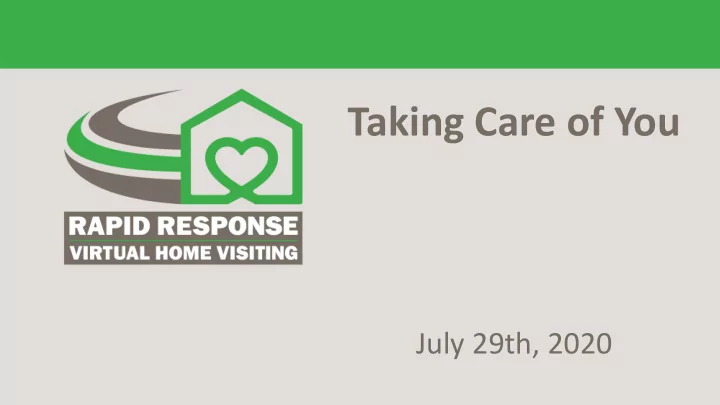

Taking Care of You July 29th, 2020
IAFSP Rapid Response Virtual Home Visiting Webinar recordings, slide decks and resources are available at: • https://institutefsp.org/co vid-19-rapid-response
Q&A and Chat Features Please use the chat box If you have a specific to respond to questions question for one of our we ask you! speakers, please use the Q&A function
Presenters Jaime Hamil , MPH Darius Tandon, PhD Shayla Collins Research Project Manager Associate Professor Rain or Shine Consulting Northwestern University Associate Director Feinburg School of Medicine Northwestern University Feinburg School of Medicine
Meeting your needs Self care isn’t selfish
“Caring for myself is not self - indulgence. It is self-preservation, and that is an act of political warfare" - Audre Lorde
Cognitive-Behavioral Strategies to Promote Self-Care Among Home Visitors Darius Tandon, PhD Jaime Hamil, MPH Northwestern University Feinberg School of Medicine www.mothersandbabiesprogram.org
Stress Affects All of Us Everyone experiences stress Stress is magnified by the COVID-19 pandemic
How Do We React To Stress? A first step in engaging in self-care is to be aware of how we respond to stress : What are things that increase our stress levels ? Related to work as a home visitor (ex., hearing about a client’s abusive relationship) Related to your life outside of being a home visitor How do we feel when our stress level increases? Physical (headaches, upset stomach) Emotional (irritable, sad)
Quick Mood Scale
What Does Self-Care Look Like? Cognitive-behavioral framework can be useful in thinking about ways to engage in self-care Cognitive = thoughts Behavior = our actions and relationships with other people
Cognitive-Behavioral Framework
Self-Care Strategies: Pleasant Activities Can be done alone, with other adults, or with children Can be brief, no/low cost, and part of everyday routines Even a small activity can help improve our mood and reduce stress
Self- Care Strategies: Building One’s Support Network Stress can be exhausting and the many demands in our lives require us to seek out support from others Supportive people can help provide meaningful breaks from the stress you have in a given day/week Home visiting supervisors Friends, family, neighbors
16
Contact Information Center for Community Health Northwestern University 750 N. Lake Shore Drive Chicago, IL 60611 mothersandbabiesnu@gmail.com www.mothersandbabiesprogram.org
Connect rapidresponse@nationalalliancehvmodels.org www.institutefsp.org
Recommend
More recommend